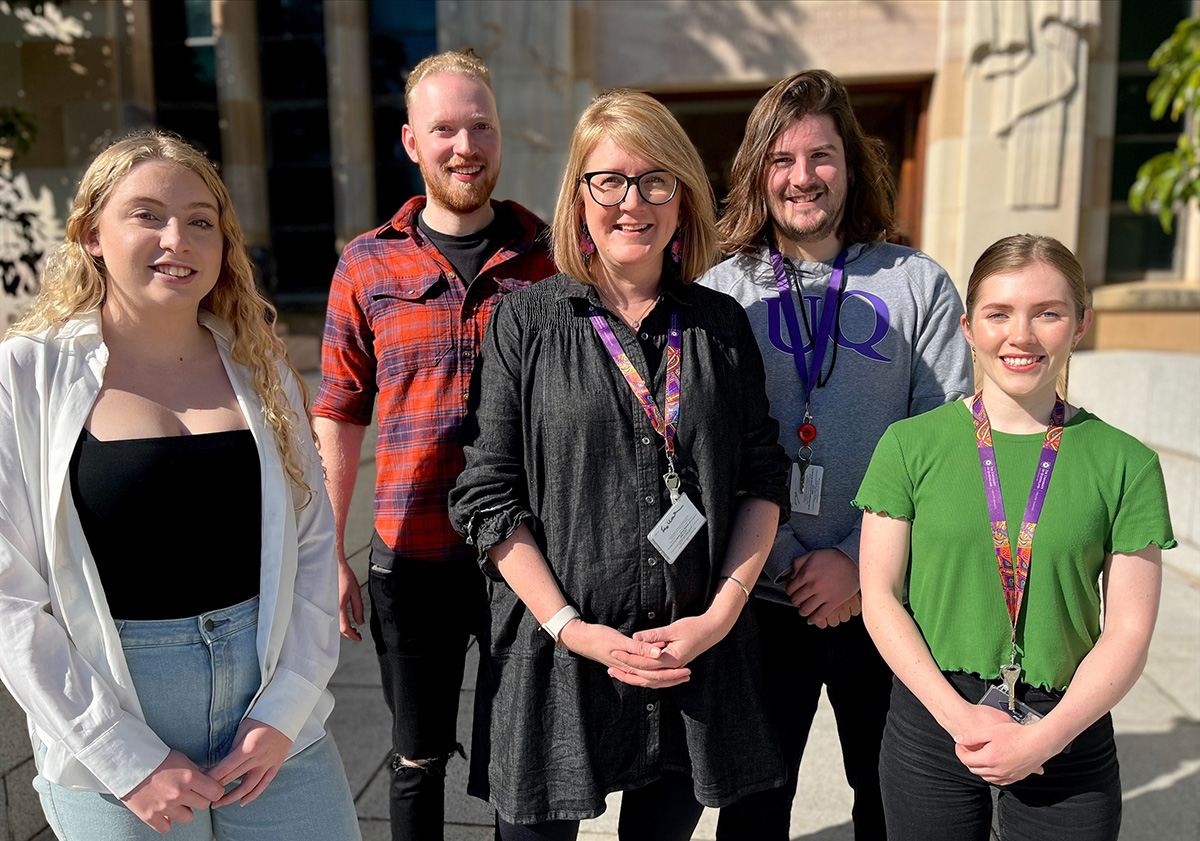Walton Group - Reproductive growth factors
The research focus of Dr Kelly Walton’s Reproductive Growth Factors (RGF) laboratory is the large family of Transforming Growth Factor –β (TGF-β) proteins, which broadly regulate cell and tissue growth and repair.
Over past the 14 years, Dr Walton’s team has developed an intricate understanding of how TGF-β proteins are synthesised and activated. Armed with this knowledge, the RGF team are now refashioning TGF-β proteins as technologies for reproductive (and muscle) applications. Dr Walton’s team also uses this structural knowledge to manipulate TGF-β genes to understand how loss or gain of function of TGF-β proteins influences reproductive function. Additionally, the RGF team works with clinicians to understand how genetic mutations in TGF-β contribute to human reproductive conditions.
The RGF team is particularly interested in the ovarian TGF-β proteins, inhibin A/B, activin A/B, anti-mullerian hormone (AMH), growth and differentiation factor 9 (GDF9) and bone morphogenetic protein 15 (BMP15). These TGF-β proteins govern ovulation rate and oocyte (ovarian egg) quality, and therefore, female reproductive potential. As such, manipulating these proteins is an attractive means to control female fertility. The RGF team develops innovative agonists or antagonists for these ovarian TGF-β proteins, and then validates the therapeutic potential of these technologies to improve (or suppress) reproductive function in preclinical models. To achieve their research goals, the RGF team uses a diverse array of experimental techniques including molecular biology, protein biochemistry, gene delivery technologies (viral vectors), cell culture, diagnostic assays and mouse models. The research outcomes of the RGF team hope to uncover new knowledge as to how ovarian TGF-β govern female fertility, and to generate novel technologies for controlling fertility in humans and animals.
Transforming fertility treatment
National Health and Medical Research Council, 2022-2025, $846,531
Craig Harrison, Kelly Walton, Daniel Bernard, Ellen Anckaert
Ovarian follicle growth and development also depends upon the activity of TGF-β proteins, including Anti-Müllerian Hormone (AMH), growth differentiation factor 9 (GDF9), bone morphogenetic protein 15 (BMP15), inhibin A and inhibin B. As such, targeting these TGF-β proteins is an attractive means to control female fertility. This project aims to develop innovative TGF-β technologies treat female infertility.
Targeting TGF-beta proteins to control animal reproduction
Australian Research Council, 2022-2024, $500,000
Kelly Walton, Craig Harrison, Simon De Graaf, Daniel Bernard
The ability of TGF-β proteins to control fertility in female mammals makes them attractive targets for regulating reproductive potential in animals. This project seeks to uncover new strategies for (1) enhancing ovulation rates and oocyte quality in livestock species, and (2) contraception in companion animals.
Over the past decade, Dr Walton’s laboratory has been awarded $2.73M in government, industry, university and philanthrophic funds.
Industry funding
- 2020 (co-CI) Lavima Fertility (Belgium). Funding for GDF9 patent to international phase ($34, 065)
- 2020 (co-CI) Scout Bio Inc Veterinary Medicine (Pennsylvania) ($72,555K)
Government funding
- 2022-2025 (CIA), ARC Discovery Project Grant: Targeting TGF-beta proteins to control animal reproduction ($500,000)
- 2022-2026 (CIB), NHMRC Project Grant: Transforming fertility treatment ($846,531)
- 2019-2021 (CIA), NHMRC Project Grant: Defining the Physiology and Therapeutic Potential of Inhibin ($672,000)
- 2015-2017 (CIA), Victorian Cancer Agency Project Grant/ Fellowship: Targeting activins for the treatment of cancer-cachexia ($198,000)
Philanthropic/Society funding
- 2018-2019 (CIA) Endocrine Society of Australia, Ken Wynne Memorial Postdoctoral Research award. Uncovering novel roles for inhibins in metabolic disease. ($30,000)
- 2018-2019 (CIA), Rebecca Cooper Foundation Project Grant: Engineered TGF-Beta proteins for the treatment of female infertility and post-menopausal complications ($100,000)
- 2016 (CIA), CASS Foundation Project Grant: Flicking the muscle switch ($57,000)
- 2013-2014 (CIA), Endocrine Society of Australia Project Grant: Targeting activins for the treatment of cancer cachexia ($50,000)
University funding
- 2021 (CI) Senior Bridging Postdoctoral Fellowship, Monash Faculty of Medicine, Nursing and Health Sciences. ($70,000)
- 2019-2020 (Co-CI) Monash Research Innovation Fund. Engineering Anti-Mullerian Hormone. ($55,103)
- 2019 (Co-CI) Monash Biomedicine Discovery Institute Seed Grant. Take it to heart: Does activin/myostatin blockade affect more than just the muscles? ($5000)
- 2018 (CIA) Monash University Project Grant: Characterising the Physiological Role of Inhibins in Males ($30,000)
- 2017 (CIA) Monash University Advancing Women’s Research Success Grant ($9400)
The RGF team works alongside inter/national field leaders in endocrinology, reproductive biology, and structural biology.
Dr Walton’s program is supported by longstanding collaborator and fellow TGF-β protein enthusiast, Associate Professor Craig Harrison at Monash University. Together Dr Walton and Associate Professor Harrison have co-authored 43 publications on TGF-β proteins, and co-supervised 5 PhD and 12 honours students to completion.
The RGF team also works closely with reproductive biology experts, Associate Professor Karla Hutt and Dr Winship at Monash University, Professor Robert Gilchrist at UNSW, Professor Moira O’Bryan at the University of Melbourne, and Professor Daniel Bernard at McGill University (Montreal, Canada).
World renowned TGF-β structural biologist Professor Tom Thompson at the University of Cinncinati (Ohio, US) works with Dr Walton’s team to develop innovative TGF-β technologies.
Understanding how persistent loss of inhibins disrupts ovarian function in ageing female mice
This project seeks to understand how withdrawal of ovarian inhibins, as occurs at menopause, influences ovarian health in ageing mice.
Understanding how elevated levels of AMH influences ovarian ageing in mice
This project uses a novel mouse model of hyper-AMH to understand the impact of persistently elevated serum AMH on ovarian ageing and female physiological health.
Understanding the physiological consequences of loss of inhibin function in females
Ovarian inhibin A and inhibin B are lost at menopause, but the physiological consequences of inhibin loss on female health are not well understood. This project explores the broader physiological impact of inhibin A/B withdrawal in females, using a mouse model of inhibin loss of function.
Generation and validation of novel TGF-β technologies for reproductive (and muscle) applications
The project involves the generation and/or validation of novel TGF-β technologies for reproductive applications. Lead TGF-β technologies are delivered using viral technologies into mice, and the resultant effects on ovarian function examined.
As several TGF-β proteins have been shown to regulate muscle health, this stream of research also entails the generation and/or validation of novel TGF-β technologies for improving muscle health.




